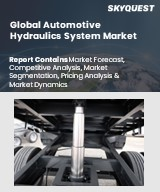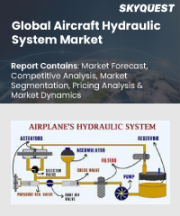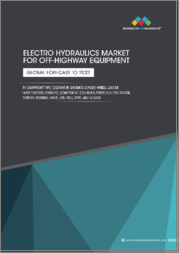
|
시장보고서
상품코드
1423569
공기압식 클램프 시스템 시장 예측(-2030년) : 유형별, 재료별, 용도별, 최종사용자별, 지역별 세계 분석Pneumatic Clamping System Market Forecasts to 2030 - Global Analysis By Type (Hold-Down Clamps, Swing Clamps, Pneumatic Vises, Toggle Clamps and Other Types), Material, Application, End User and By Geography |
||||||
Stratistics MRC에 따르면 세계의 공기압식 클램프 시스템 시장은 2023년에 109억 달러를 차지하고 예측 기간 중 CAGR 11.3%로 성장하며, 2030년에는 230억 달러에 달할 전망입니다.
공압식 클램핑 시스템은 압축 공기를 사용하여 힘을 발생시켜 물체를 제자리에 단단히 고정하는 메커니즘의 일종입니다. 실린더, 밸브 및 액추에이터와 같은 공압 컴포넌트를 사용하여 압력을 가하여 공작물이나 재료를 고정합니다. 이러한 시스템은 다양한 산업 용도에서 일반적으로 사용됩니다. 압축 공기에 의해 생성된 압력으로 인해 시스템은 물체를 빠르게 파악하거나 해제할 수 있으므로 많은 산업 분야에서 다재다능하고 일반적인 선택이 되고 있습니다.
세계 산업 성장
세계 제조업, 특히 신흥 국가을 중심으로 한 제조업의 확장은 효율적이고 신뢰할 수 있는 클램핑 시스템에 대한 수요를 자극하여 시장 확대에 기여하고 있습니다. 이러한 시스템은 빠르고 효율적인 클램핑 및 언클램핑을 제공하여 생산 사이클 시간을 단축하고 전체 제조 공정의 효율성을 높입니다. 공압 시스템의 컴포넌트는 전 세계에서 널리 사용 가능하며 종종 표준화된 사양을 따르기 때문에 다양한 지역에서 쉽게 조달, 정비 및 수리 할 수 있습니다.
제한된 힘과 정확도
공압 시스템은 유압 시스템이나 전자 시스템만큼 큰 힘과 정밀도를 제공하지 못할 수 있습니다. 공압 시스템은 정확하고 일관된 힘을 제공하는 데 한계가 있는 경우가 많습니다. 공압 시스템에서 발휘되는 힘은 유압 시스템이나 전기 시스템만큼 쉽게 제어하거나 세밀하게 조정할 수 없는 경우가 있습니다. 이는 높은 정밀도로 힘을 가해야 하는 경우 단점이 될 수 있으며, 시장 성장을 저해할 수 있습니다.
기술의 발전
지속적인 기술 발전으로 더욱 정교하고 지능적인 공압 클램핑 시스템이 개발되고 있습니다. 센서, IoT 기능 및 자동화 기술과의 통합으로 효율성, 신뢰성 및 다양한 제조 공정에 대한 적응성이 향상되었습니다. 기술의 발전으로 압력 센서, 비상 정지 기능, 페일 세이프와 같은 안전 기능이 개발되고 있습니다. 이는 시장 성장을 가속하는 요인으로 작용하고 있습니다.
공해에 대한 민감도
습기나 먼지 입자와 같은 공기 공급 중 오염 물질은 공압 시스템의 기능에 영향을 미칠 수 있습니다. 먼지, 먼지, 습기와 같은 오염 물질은 공압 시스템의 성능에 영향을 미칠 수 있습니다. 밸브, 실린더 또는 실이 막히거나 손상되어 누출 및 효율성 저하로 이어질 수 있습니다. 공압 시스템 내의 오염 물질이 주변 지역으로 방출되면 환경적 위험을 초래하고 시장 성장을 저해할 수 있습니다.
COVID-19의 영향 :
팬데믹은 전 세계 공급망에 혼란을 일으켜 공압 클램핑 시스템 제조에 필요한 원자재 및 부품공급이 지연되었습니다. 이로 인해 많은 제조업체의 생산이 중단되고 비용이 상승했습니다. COVID-19는 직장 안전의 중요성을 강조했습니다. 공압 클램핑 시스템은 정확성과 신뢰성으로 인해 제조 환경에서 안정적이고 안전한 작업을 보장하는 능력으로 인해 계속해서 중요한 위치를 차지하고 있습니다.
예측 기간 중 스윙 클램프 부문이 가장 큰 비중을 차지할 것으로 예상
스윙 클램프 부문은 예측 기간 중 가장 큰 시장 규모에 달할 것으로 예상됩니다. 스윙 클램프는 다른 유형의 클램프에 비해 공간이 덜 필요하기 때문에 공간이 제한된 용도에 적합합니다. 클램프 및 릴리스 동작이 빠르기 때문에 자동화 시스템의 사이클 시간을 크게 단축하고 전반적인 생산성을 향상시킬 수 있습니다. 이러한 클램프는 종종 높은 반복성과 신뢰성을 목표로 설계되어 여러 사이클에 걸쳐 안정적인 클램핑 성능을 보장합니다.
예측 기간 중 가장 높은 CAGR을 보일 것으로 예상되는 분야는 로봇 분야입니다.
예측 기간 중 가장 높은 CAGR을 보일 것으로 예상되는 분야는 로봇 분야입니다. 공압 시스템은 빠른 응답성으로 인해 빠른 클램핑 및 릴리스 동작을 가능하게 합니다. 이러한 속도는 빠른 움직임이 요구되는 로봇 용도에서 매우 중요합니다. 공압 시스템은 유압 시스템이나 전기기계 시스템에 비해 부품 수가 적고, 설계, 설치 및 유지보수가 비교적 간단합니다. 또한 다른 대안에 비해 비용 효율성이 높습니다.
가장 큰 점유율을 차지하는 지역
북미는 제조 자동화, 생산 공정의 정확성과 효율성에 대한 요구, 첨단 기계에 대한 수요 등 다양한 요인으로 인해 예측 기간 중 가장 큰 시장 점유율을 차지할 것으로 예상됩니다. 이러한 시스템은 빠른 클램핑, 높은 정확도, 신뢰성 등의 이점을 제공하며 현대 제조업에 필수적인 요소로 자리 잡고 있습니다. 시장 경쟁자들은 경쟁 우위를 확보하기 위해 기술 혁신, 제품 개발 및 전략적 파트너십에 중점을 두는 경우가 많습니다.
CAGR이 가장 높은 지역 :
아시아태평양은 예측 기간 중 가장 높은 CAGR을 유지할 것으로 예상됩니다. 이 시장에 영향을 미치는 요인으로는 기술 발전, 인더스트리 4.0 관행의 채택, 제조 자동화에 대한 투자 증가, 고품질 표준을 유지하면서 생산 주기 시간을 단축하는 데 중점을 두고 있는 점 등을 들 수 있습니다. 이 지역 전체, 특히 중국과 인도의 지속적인 산업 확장은 공장 및 생산 시설에서 공압 클램핑 시스템에 대한 수요를 주도하고 있습니다.
무료 맞춤형 서비스 :
이 보고서를 구독하는 고객은 다음과 같은 무료 맞춤화 옵션 중 하나를 사용할 수 있습니다. :
- 기업 개요
- 추가 시장 기업의 종합적인 프로파일링(최대 3사)
- 주요 기업의 SWOT 분석(최대 3사)
- 지역 세분화
- 고객의 관심에 따른 주요 국가별 시장 추정치, 예측, CAGR(주: 타당성 확인에 따라 다름)
- 경쟁사 벤치마킹
- 제품 포트폴리오, 지역적 입지, 전략적 제휴를 기반으로 한 주요 기업 벤치마킹
목차
제1장 주요 요약
제2장 서문
- 개요
- 이해관계자
- 조사 범위
- 조사 방법
- 데이터 마이닝
- 데이터 분석
- 데이터 검증
- 조사 어프로치
- 조사 소스
- 1차 조사 소스
- 2차 조사 소스
- 전제조건
제3장 시장 동향 분석
- 촉진요인
- 억제요인
- 기회
- 위협
- 애플리케이션 분석
- 최종사용자 분석
- 신흥 시장
- 신종 코로나바이러스 감염증(COVID-19)의 영향
제4장 Porter's Five Forces 분석
- 공급 기업의 교섭력
- 구매자의 교섭력
- 대체품의 위협
- 신규 진출업체의 위협
- 경쟁 기업간 경쟁 관계
제5장 세계의 공기압식 클램프 시스템 시장 : 유형별
- 홀드 다운 클램프
- 스윙 클램프
- 공기압 바이스
- 토글 클램프
- 기타 유형
제6장 세계의 공기압식 클램프 시스템 시장 : 재료별
- 강철
- 알루미늄
- 플라스틱
- 고무
- 기타 재료
제7장 세계의 공기압식 클램프 시스템 시장 : 용도별
- 목공
- 금속 가공
- 로봇공학
- 플라스틱 성형품
- 기타 용도
제8장 세계의 공기압식 클램프 시스템 시장 : 최종사용자별
- 일렉트로닉스
- 자동차
- 항공우주
- 제조업
- 기타 최종사용자
제9장 세계의 공기압식 클램프 시스템 시장 : 지역별
- 북미
- 미국
- 캐나다
- 멕시코
- 유럽
- 독일
- 영국
- 이탈리아
- 프랑스
- 스페인
- 기타 유럽
- 아시아태평양
- 일본
- 중국
- 인도
- 호주
- 뉴질랜드
- 한국
- 기타 아시아태평양
- 남미
- 아르헨티나
- 브라질
- 칠레
- 기타 남미
- 중동 및 아프리카
- 사우디아라비아
- 아랍에미리트
- 카타르
- 남아프리카공화국
- 기타 중동 및 아프리카
제10장 주요 발전
- 계약, 파트너십, 협업, 합병사업
- 인수합병
- 신제품의 발매
- 사업 확대
- 기타 주요 전략
제11장 기업 개요
- Roemheld Group
- SMC Corporation
- Jergens, Inc.
- Umrao Automation Pvt. Ltd
- Hytech Machine Tool & Automation(india) Pvt. Ltd.
- Quicloc Pvt Ltd
- Carr Lane Manufacturing
- AMF Andreas Maier GmbH & Co. KG
- Kurt Workholding
- Fixtureworks
According to Stratistics MRC, the Global Pneumatic Clamping System Market is accounted for $10.9 billion in 2023 and is expected to reach $23.0 billion by 2030 growing at a CAGR of 11.3% during the forecast period. A pneumatic clamping system is a type of mechanism that uses compressed air to create force and hold objects firmly in place. It employs pneumatic components such as cylinders, valves, and actuators to exert pressure and secure workpieces or materials. These systems are commonly used in various industrial applications. The pressure generated by the compressed air enables the system to grip or release objects swiftly, making it a versatile and popular choice in many industries.
Market Dynamics:
Driver:
Global industrial growth
The expansion of manufacturing industries globally, especially in emerging economies, fuels the demand for efficient and reliable clamping systems, contributing to market expansion. These systems provide quick and efficient clamping and unclamping, reducing production cycle times and increasing overall efficiency in manufacturing processes. Pneumatic systems components are widely available across the globe, and they often follow standardized specifications, making them easier to source, maintain, and repair in various regions.
Restraint:
Limited force and precision
Pneumatic systems might not provide as much force or precision as hydraulic or electronic systems. Pneumatic systems often have limitations in providing precise and consistent force. The force exerted by a pneumatic system might not be as easily controllable or as finely adjustable as with hydraulic or electric systems. This can be a drawback when high precision in force application is required, which may hamper the growth of the market.
Opportunity:
Technological advancements
Ongoing technological advancements lead to the development of more sophisticated and intelligent pneumatic clamping systems. Integration with sensors, IoT capabilities, and automation technologies enhances their efficiency, reliability, and adaptability to various manufacturing processes. Advancements in technology have led to the development of safety features such as pressure sensors, emergency stop functions, and fail-safes. These are the factors driving the growth of the market.
Threat:
Susceptibility to contamination
Contaminants in the air supply, such as moisture or dirt particles, can affect the functioning of pneumatic systems. Contaminants like dust, dirt, or moisture can affect the performance of pneumatic systems. They can clog or damage valves, cylinders, or seals, leading to leaks or reduced efficiency. Contaminants in pneumatic systems pose environmental risks if they are released into the surrounding area, which restrains the growth of the market.
Covid-19 Impact:
The pandemic disrupted global supply chains, causing delays in the delivery of raw materials and components that are necessary for manufacturing pneumatic clamping systems. This led to production slowdowns and increased costs for many manufacturers. The pandemic emphasized the importance of safety in workplaces. Pneumatic clamping systems, with their precision and reliability, continued to be relevant due to their ability to ensure secure and safe operations in manufacturing environments.
The swing clamps segment is expected to be the largest during the forecast period
The swing clamps segment is expected to be the largest during the forecast period. Swing clamps are compact and require less space compared to other types of clamps, making them suitable for applications where space is limited. They provide quick clamping and release actions, which can significantly reduce cycle times in automated systems, enhancing overall productivity. These clamps are often designed for high repeatability and reliability, ensuring consistent clamping performance over numerous cycles.
The robotics segment is expected to have the highest CAGR during the forecast period
The robotics segment is expected to have the highest CAGR during the forecast period. Pneumatic systems are quick to respond, allowing for rapid clamping and release actions. This speed is crucial in robotic applications where quick movements are required. These systems often have fewer components compared to hydraulic or electromechanical systems, making them relatively simple to design, install, and maintain. They are also cost-effective compared to some alternatives.
Region with largest share:
North America is projected to hold the largest market share during the forecast period due to various factors such as automation in manufacturing, the need for precision and efficiency in production processes, and the demand for advanced machinery. These systems offer advantages like quick clamping, high precision, and reliability, making them essential in modern manufacturing. Market players often focus on innovation, product development, and strategic partnerships to gain a competitive edge.
Region with highest CAGR:
Asia Pacific is projected to hold the highest CAGR over the forecast period. Factors impacting this market include technological advancements, the adoption of Industry 4.0 practices, increasing investments in manufacturing automation, and the emphasis on reducing production cycle times while maintaining high-quality standards. Ongoing industrial expansion across the region, especially in China and India, drives the demand for pneumatic clamping systems in factories and production facilities.
Key players in the market
Some of the key players in Pneumatic Clamping System market include Roemheld Group, SMC Corporation, Jergens, Inc., Umrao Automation Pvt. Ltd, Hytech Machine Tool & Automation (india) Pvt. Ltd., Quicloc Pvt Ltd, Carr Lane Manufacturing, AMF Andreas Maier GmbH & Co. KG, Kurt Workholding and Fixtureworks.
Key Developments:
In July 2023, Fixtureworks introduced its pneumatic clamp fasteners. Fixtureworks is offering a lineup of pneumatic clamp fasteners that reportedly provide instant clamping. These air-assisted clamping systems are designed for quick change applications and for frequent changeover of tooling, plates and fixtures, reducing setup time in multiple parts holding.
In April 2023, Fixtureworks launched quick-release clamps and ball-lock fasteners for fast set-ups. Quick-release clamps and ball-locking pins and fasteners have a wide range of applications in fastening, locating, and alignment.
Types Covered:
- Hold-Down Clamps
- Swing Clamps
- Pneumatic Vises
- Toggle Clamps
- Other Types
Materials Covered:
- Steel
- Aluminum
- Plastics
- Rubber
- Other Materials
Applications Covered:
- Woodworking
- Metalworking
- Robotics
- Plastic Molding
- Other Applications
End Users Covered:
- Electronics
- Automotive
- Aerospace
- Manufacturing
- Other End Users
Regions Covered:
- North America
- US
- Canada
- Mexico
- Europe
- Germany
- UK
- Italy
- France
- Spain
- Rest of Europe
- Asia Pacific
- Japan
- China
- India
- Australia
- New Zealand
- South Korea
- Rest of Asia Pacific
- South America
- Argentina
- Brazil
- Chile
- Rest of South America
- Middle East & Africa
- Saudi Arabia
- UAE
- Qatar
- South Africa
- Rest of Middle East & Africa
What our report offers:
- Market share assessments for the regional and country-level segments
- Strategic recommendations for the new entrants
- Covers Market data for the years 2021, 2022, 2023, 2026, and 2030
- Market Trends (Drivers, Constraints, Opportunities, Threats, Challenges, Investment Opportunities, and recommendations)
- Strategic recommendations in key business segments based on the market estimations
- Competitive landscaping mapping the key common trends
- Company profiling with detailed strategies, financials, and recent developments
- Supply chain trends mapping the latest technological advancements
Free Customization Offerings:
All the customers of this report will be entitled to receive one of the following free customization options:
- Company Profiling
- Comprehensive profiling of additional market players (up to 3)
- SWOT Analysis of key players (up to 3)
- Regional Segmentation
- Market estimations, Forecasts and CAGR of any prominent country as per the client's interest (Note: Depends on feasibility check)
- Competitive Benchmarking
- Benchmarking of key players based on product portfolio, geographical presence, and strategic alliances
Table of Contents
1 Executive Summary
2 Preface
- 2.1 Abstract
- 2.2 Stake Holders
- 2.3 Research Scope
- 2.4 Research Methodology
- 2.4.1 Data Mining
- 2.4.2 Data Analysis
- 2.4.3 Data Validation
- 2.4.4 Research Approach
- 2.5 Research Sources
- 2.5.1 Primary Research Sources
- 2.5.2 Secondary Research Sources
- 2.5.3 Assumptions
3 Market Trend Analysis
- 3.1 Introduction
- 3.2 Drivers
- 3.3 Restraints
- 3.4 Opportunities
- 3.5 Threats
- 3.6 Application Analysis
- 3.7 End User Analysis
- 3.8 Emerging Markets
- 3.9 Impact of Covid-19
4 Porters Five Force Analysis
- 4.1 Bargaining power of suppliers
- 4.2 Bargaining power of buyers
- 4.3 Threat of substitutes
- 4.4 Threat of new entrants
- 4.5 Competitive rivalry
5 Global Pneumatic Clamping System Market, By Type
- 5.1 Introduction
- 5.2 Hold-Down Clamps
- 5.3 Swing Clamps
- 5.4 Pneumatic Vises
- 5.5 Toggle Clamps
- 5.6 Other Types
6 Global Pneumatic Clamping System Market, By Material
- 6.1 Introduction
- 6.2 Steel
- 6.3 Aluminum
- 6.4 Plastics
- 6.5 Rubber
- 6.6 Other Materials
7 Global Pneumatic Clamping System Market, By Application
- 7.1 Introduction
- 7.2 Woodworking
- 7.3 Metalworking
- 7.4 Robotics
- 7.5 Plastic Molding
- 7.6 Other Applications
8 Global Pneumatic Clamping System Market, By End User
- 8.1 Introduction
- 8.2 Electronics
- 8.3 Automotive
- 8.4 Aerospace
- 8.5 Manufacturing
- 8.6 Other End Users
9 Global Pneumatic Clamping System Market, By Geography
- 9.1 Introduction
- 9.2 North America
- 9.2.1 US
- 9.2.2 Canada
- 9.2.3 Mexico
- 9.3 Europe
- 9.3.1 Germany
- 9.3.2 UK
- 9.3.3 Italy
- 9.3.4 France
- 9.3.5 Spain
- 9.3.6 Rest of Europe
- 9.4 Asia Pacific
- 9.4.1 Japan
- 9.4.2 China
- 9.4.3 India
- 9.4.4 Australia
- 9.4.5 New Zealand
- 9.4.6 South Korea
- 9.4.7 Rest of Asia Pacific
- 9.5 South America
- 9.5.1 Argentina
- 9.5.2 Brazil
- 9.5.3 Chile
- 9.5.4 Rest of South America
- 9.6 Middle East & Africa
- 9.6.1 Saudi Arabia
- 9.6.2 UAE
- 9.6.3 Qatar
- 9.6.4 South Africa
- 9.6.5 Rest of Middle East & Africa
10 Key Developments
- 10.1 Agreements, Partnerships, Collaborations and Joint Ventures
- 10.2 Acquisitions & Mergers
- 10.3 New Product Launch
- 10.4 Expansions
- 10.5 Other Key Strategies
11 Company Profiling
- 11.1 Roemheld Group
- 11.2 SMC Corporation
- 11.3 Jergens, Inc.
- 11.4 Umrao Automation Pvt. Ltd
- 11.5 Hytech Machine Tool & Automation (india) Pvt. Ltd.
- 11.6 Quicloc Pvt Ltd
- 11.7 Carr Lane Manufacturing
- 11.8 AMF Andreas Maier GmbH & Co. KG
- 11.9 Kurt Workholding
- 11.10 Fixtureworks



















